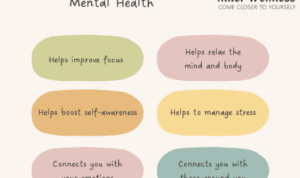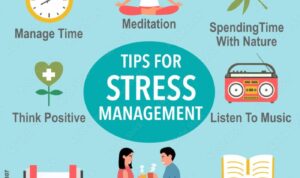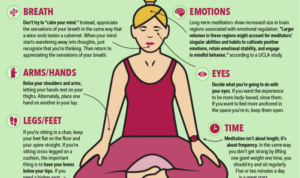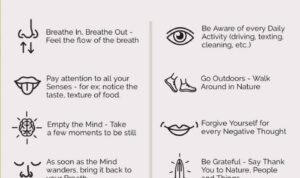Stress Management Tips: Reduce Stress and Thrive brings you the ultimate guide to conquering stress like a boss. Dive into the world of stress-free living with these game-changing strategies that will have you feeling zen in no time.
From understanding the importance of stress management to identifying your triggers and mastering effective techniques, this guide has everything you need to reclaim your peace of mind. Let’s kick stress to the curb and step into a life of calm and balance.
Importance of Stress Management
Stress management is crucial for overall well-being because it helps individuals cope with the daily challenges and pressures of life. Without effective stress management techniques, unmanaged stress can have severe negative impacts on both physical and mental health.
Negative Impact of Unmanaged Stress
- Increased risk of heart disease and high blood pressure
- Compromised immune system, leading to frequent illnesses
- Chronic headaches, muscle tension, and body aches
- Anxiety, depression, and other mental health disorders
Benefits of Incorporating Stress Management Techniques
- Improved overall health and well-being
- Enhanced ability to focus and concentrate
- Better sleep quality and increased energy levels
- Reduced risk of developing chronic illnesses
Identifying Stress Triggers: Stress Management Tips
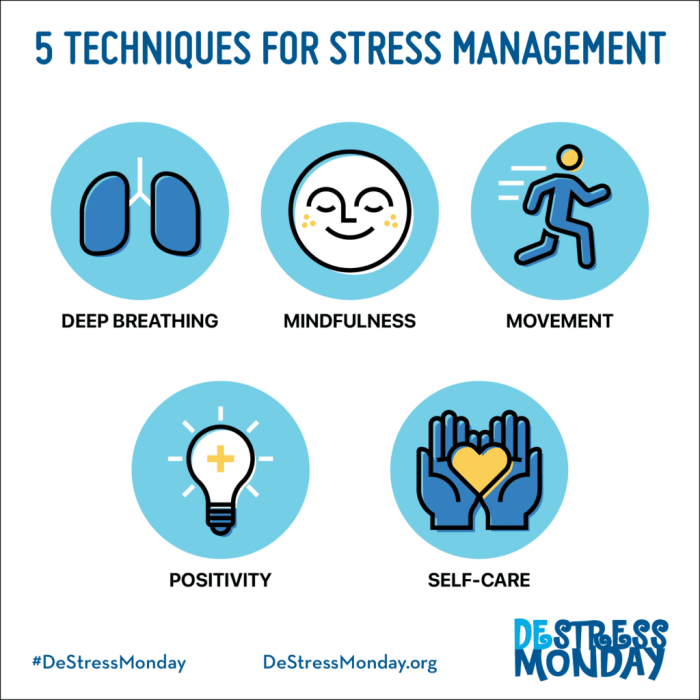
Stress triggers are those sneaky little things that can send you spiraling into a stress overload without warning. It’s important to identify these triggers in order to effectively manage and reduce stress in your life. Here are some common stress triggers and tips on how to recognize and track them:
Common Stress Triggers
- Work deadlines
- Relationship issues
- Financial worries
- Health problems
- Major life changes
Recognizing Personal Stress Triggers
Personal stress triggers can vary from person to person, so it’s essential to pay attention to what specifically causes stress in your life. Some ways to recognize personal stress triggers include:
- Noticing physical symptoms like headaches, muscle tension, or stomach issues
- Identifying recurring patterns of stress in certain situations or with specific people
- Keeping track of your emotional reactions to different events or circumstances
Keeping a Stress Journal
One effective way to track stress triggers and patterns is by keeping a stress journal. This can help you pinpoint what exactly is causing stress in your life and how you can better manage it. Here are some tips for keeping a stress journal:
- Write down the date and time of stressful events
- Describe the event and your reaction to it
- Note any physical or emotional symptoms you experienced
- Reflect on any patterns or common triggers that arise
Effective Stress Management Techniques
Managing stress effectively is crucial for maintaining overall well-being. There are several techniques that can help in reducing stress levels and promoting a sense of calm and balance in our lives.
Deep Breathing
Deep breathing exercises involve taking slow, deep breaths to help calm the mind and body. By focusing on your breath, you can lower stress levels and reduce feelings of anxiety. Practice deep breathing for a few minutes each day to experience its calming effects.
Meditation
Meditation is a powerful tool for managing stress. By practicing mindfulness and focusing on the present moment, you can quiet the mind and reduce negative thoughts. Regular meditation can help improve overall mental well-being and reduce stress levels significantly.
Exercise
Exercise is not only beneficial for physical health but also for mental well-being. Physical activity releases endorphins, which are known as “feel-good” hormones that can help reduce stress and improve mood. Incorporating regular exercise into your routine can be an effective way to manage stress levels.
Mindfulness
Mindfulness involves paying attention to the present moment without judgment. By practicing mindfulness, you can become more aware of your thoughts and emotions, and learn to respond to stress in a more calm and composed manner. Mindfulness techniques, such as mindful breathing or body scans, can be helpful in reducing stress.
Creating a Stress-Free Environment
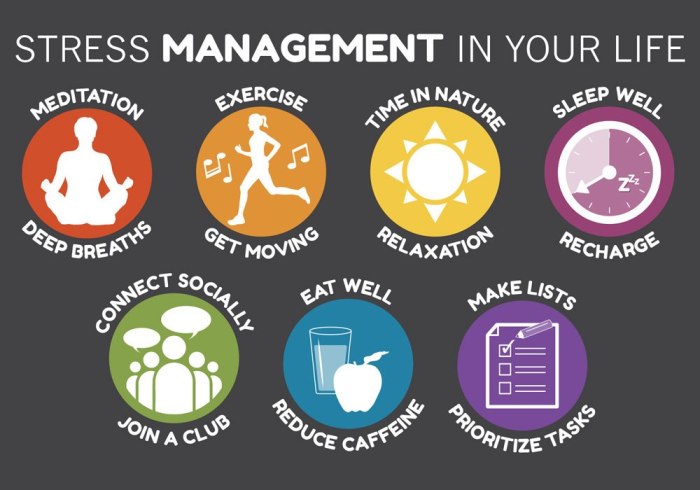
Creating a stress-free environment is crucial for maintaining our mental and emotional well-being. By making some simple changes to our living or working space, we can significantly reduce stress levels and promote a sense of calm and organization.
Decluttering for Peace of Mind
- Start by decluttering your space and getting rid of items that no longer serve a purpose. A clean and organized environment can help clear your mind and reduce feelings of overwhelm.
- Designate specific areas for different tasks to maintain order and prevent chaos from creeping in.
- Utilize storage solutions such as bins, baskets, and shelves to keep belongings neatly stored and easily accessible.
Time Management for Stress Reduction
- Create a daily schedule or to-do list to prioritize tasks and manage your time effectively. This can help prevent last-minute rushes and reduce feelings of stress and anxiety.
- Set realistic deadlines for projects and break tasks into smaller, manageable steps to avoid feeling overwhelmed.
- Avoid multitasking and focus on one task at a time to improve productivity and reduce stress levels.
Setting Boundaries for Peaceful Living
- Learn to say no to activities or commitments that will overextend your time and energy. Setting boundaries is essential for protecting your mental and emotional well-being.
- Communicate your limits to others and prioritize self-care to prevent burnout and reduce stress levels.
- Establish a work-life balance by separating work responsibilities from personal time. Setting boundaries between these areas can help you recharge and unwind.
Incorporating Relaxation Practices into Daily Routines, Stress Management Tips
- Engage in relaxation techniques such as deep breathing, meditation, or yoga to promote a sense of calm and reduce stress levels.
- Schedule regular breaks throughout the day to rest and recharge. Taking time for yourself can improve focus and productivity while reducing feelings of stress and tension.
- Create a soothing environment with calming scents, soft lighting, and comfortable furniture to enhance relaxation and promote a sense of tranquility.







